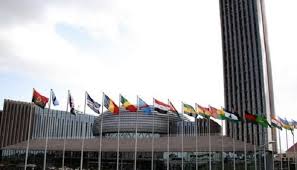On May 25, 1963 in Addis Ababa (Ethiopia), the founding fathers divided into two blocs (the Casablanca group and the Monrovia group) on the need to immediately create where gradually the United States of Africa resolved to progressive place of the project by favoring decolonization and the fight against Apartheid in South Africa.
In 1999 in Sirte (Libya), Colonel Gaddafi resuscitated the idea of the Ghanaian Nkrumah after evaluating the success of the Organization of African Unity (OAU) in achieving its main objective focused on the decolonization of the continent and the eradication apartheid. The Libyan leader proposed to his peers the need to transform the OAU into an African Union based on the political unity of the continent as desired by Nkrumah in 1963 with the establishment of the United States of Africa. Here too, the project seems lost along the way.
But the OAU not having existed, it would have had to be created all the same. “Our founding fathers and predecessors were bold enough to lay the groundwork. It is up to the new generations to give it content, ”says Pan-Africanist archivist of the Garveiste current Nynsymb Lascony. “No generation can sit peacefully and expect to receive filled bread from heaven. Utopia is nothing more than a dream that has not yet come to fruition. With the combined effort, we will succeed, “says this afro-optimist.
Africa Day, established following the creation of the OAU 58 years ago, is an opportunity for each country to organize events with the aim of fostering rapprochement between the peoples of Africa. Today, this day has become a tradition deeply rooted in all African countries, and it represents the symbol of the struggle of the entire continent for liberation, development and economic progress.
The figures speak for themselves: the continent’s per capita GDP is the lowest in the world. Despite immeasurable natural resources, the land of Lucia is home to over 70% of people living in extreme poverty.
In view of all of the above, our opinion remains the same and does not change. The impetus for change must come from within. Partnerships with the outside are important as long as they are part of the African agenda. With all due respect to the IMF and the World Bank, no plan devised outside the continent has brought about qualitative development in 60 years of therapy and theory.
One of the founding fathers of the Pan-African organization, Julius Nyerere, declared these words bequeathed to posterity: “The choice is not between change or no change; the choice for Africa is between changing or being changed, changing our existence under our own leadership, or being changed by the clash of forces beyond our control. There is no stability in stagnation; stability can only be achieved through maintaining a balance during rapid transformation. “



